
What role does diaspora activism play in addressing human rights issues globally?
Diaspora activism plays a significant role in addressing human rights issues globally, leveraging the unique position of expatriates to influence change in their home countries and beyond. Here are some key ways in which diaspora communities contribute to human rights advocacy:
### 1. **Raising Awareness**
– **Information Dissemination**: Diaspora activists often use social media, blogs, and traditional media to raise awareness about human rights abuses occurring in their home countries, bringing global attention to issues that may be overlooked.
– **Storytelling**: Sharing personal stories and testimonies of human rights violations can humanise the issues and create empathy among broader audiences.
### 2. **Advocacy and Lobbying**
– **Political Engagement**: Diaspora communities can engage with their host country’s political system, lobbying for policies that support human rights in their countries of origin. This can include advocating for sanctions, resolutions, or humanitarian assistance.
– **Building Coalitions**: They often collaborate with local and international human rights organisations, forming coalitions that amplify their voices and efforts.
### 3. **Fundraising and Resource Mobilisation**
– **Financial Support**: Diaspora communities frequently mobilise financial resources to support human rights organisations, legal aid for victims, and advocacy campaigns. This funding can be crucial for local NGOs operating in challenging environments.
– **Skill Sharing**: Many members of the diaspora bring skills, expertise, and networks that can enhance the capacity of local activists and organisations.
### 4. **Education and Capacity Building**
– **Training and Workshops**: Diaspora activists may organise training sessions and workshops to equip local activists with tools and knowledge on human rights advocacy, legal frameworks, and effective campaigning strategies.
– **Scholarships and Mentorship**: They can provide educational opportunities and mentorship for young activists, helping to cultivate the next generation of human rights defenders.
### 5. **Creating Global Networks**
– **Transnational Movements**: Diaspora activism often leads to the formation of transnational movements that connect individuals and organisations across borders, fostering solidarity and coordinated efforts against human rights abuses.
– **Cultural Exchange**: This network can facilitate cultural exchange and enhance the understanding of human rights issues within different contexts.
### 6. **Utilising International Mechanisms**
– **Engagement with International Bodies**: Diaspora activists can engage with international human rights mechanisms, such as the United Nations, providing reports, testimonies, and recommendations to pressure governments and promote accountability.
– **Global Advocacy Campaigns**: They often participate in or initiate global campaigns that call for action, such as petitions, marches, and awareness-raising events.
### 7. **Fostering Solidarity and Empowerment**
– **Community Building**: Diaspora activism helps to empower individuals within the community, fostering a sense of solidarity and collective responsibility for addressing human rights issues.
– **Cultural Preservation**: By advocating for human rights, diaspora communities also work to preserve their cultural identities and histories, which can be essential in the context of oppression.
### Conclusion
Overall, diaspora activism is a powerful tool for addressing human rights issues globally. It not only brings attention to injustices but also mobilises resources, networks, and political will to advocate for change. The impact of diaspora communities is often profound, contributing to both local and international movements for justice, accountability, and human rights.






